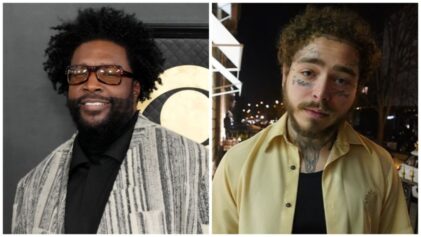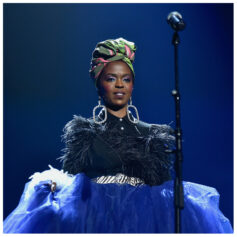Finally, someone in the hip-hop industry who isn’t hopping all aboard the Miley Cyrus bandwagon. When Questlove was asked for his opinion on Miley’s crazy antics recently, he explained that he feels the songstress is simply trying on black culture and using it as an accessory.
While fans were confused after Miley’s VMA performance, twerking videos and even her nude “Wrecking Ball” music video, it seemed as if many hip-hop stars were showing the former Disney star much more attention. Big Sean, Jay Z, French Montana, and Mike Will are only a few of the hip-hop sensations who have been giving Miley’s antics the thumbs up and even featuring her in their music.
When it was Questlove’s turn to speak on the matter, however, he certainly wasn’t on team Miley.
Questlove’s stance aligns with the Instagram quote that has garnered over 7,000 likes over the past few days.
“Black culture is popular, black people are not,” the caption said along with a photo of petite white models wearing baggy clothes that were promoted as being Compton-inspired street wear.
When The Associated Press asked Questlove for his take on Miley’s behavior, he rephrased the question with a question of his own.
“Or the idea of Miley using us as accessories,” he questions. “I don’t know.”
While other members of the hip-hop community are defending the 20-year-old’s twerking phase and revealing outfits, the drummer for The Roots believes she’s objectifying African-Americans.
“At the end of the day, it’s like, is that objectifying us,” he continued. “Hip hop is already a one-dimensional view as far as us looking like caricatures…. Yeah, I’m all for collaborating, my life is based on collaborations, but I’m more concerned about what it’s based in. Is it genuine interest or is it like a benign curiosity about a culture? I don’t want her to just take that we’re just good for twerking and having big (butts).”
He even compared Miley’s phase to the way Gwen Stefani seemed obsessed with Asian culture at one point.
“I kind of felt some sort of way when Gwen Stefani went through her Asian phase as accessories,” he said.
The point here, is that exploring another culture is perfectly fine and often encouraged, but to dig into the stereotypical version of a culture which is perpetuated in the media for the sake of a gimmick, is an entirely different discussion.


